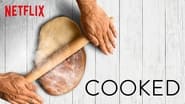jorgitovk
The initial approaching is quite exciting, an anthropologist journey into the origins of the cuisine culture itself,... I like the idea.Unfortunately you will find yourself socked by the prejudice male sexist speech of the author. All served with abundant ethnocentrism, and 'pearls' like "how barbecue's build our manhood" and worse. Very offensive for women, and an insult to the intelligence and critical thinking in general.
bellebones-33752
Spoiler alert - I couldn't continue watching after an aboriginal woman snapped a giant lizards legs "so he wouldn't scratch" her while she carried him around. If you're going to eat the poor thing at least don't torture it. That scene made me want to vomit. It's disheartening because I was genuinely looking forward to learning about cooking on a meta scale, but I'd rather research on my own without having to view the shocking image of a woman being cruel. It seems that if our brains were so large and advanced that we would stop being so archaic. Anyone who holds reptiles especially close to their hearts will be devastated by the manner in which they are still tortured and killed - even now when this film was made in 2016.
oneseat
I always like the way Michael Pollan divides him musings into food categories that connect to cultural beliefs and historical discoveries, as he did, for instance in Botany of Desire. He did this in Cooked by devoting each episode to one of the ancient elements of fire, water, air, and earth. I won't say what foods and cultures they correspond to; discover the connections yourself. Allow Pollan to take you to unexpected places of cooking excellence and expertise. I grew up in a large, somewhat stressed family that relied on prepared convenience food much of the time. I am talking Tater Tots, Hamburger Helper, fish sticks, pot pies, and canned chili, so I don't have great role models for cooking food that is fresh and natural, eco-friendly, and nutritious. Nevertheless, I aspire to do so.If you are like me, you can't always cook an evening meal, but this series inspires me to try to do so a little more often.
Greg Clark
Although this series starts with the interesting techniques of a group of Aborigines in Australia, there really is little new or interesting, or even that factual in this documentary and the show degenerates in to a smarmy, upper class, preach about the perils of not cooking properly. Yes people eat too much junk food, that much is clear, but to generate enough time of an hour cooking every day for a lot of people is just not realistic and the whole thing seems out of touch with reality. In an ideal world we'd all sit around with a source of a thousand, organic, fresh ingredients, but there are ways to do this without going back in to the past completely. At times the narrator and presenter produces some of the most general sweeping statements about food culture in the world and often seems to think that "the West" actually means "America". The food is pretty good to look at, but there's not a whole lot of interesting or different dishes in there. The presenter says a couple of times things like "Oh, you're doing what the French call 'XXXXX' and you didn't even know the name! That's fantastic!" which is just about as patronizing as you get. It's a shame. The most interesting person in the show was probably the food expert, Harry Balzer. He actually had something interesting to say that was aside from all the misty-eyed, 'it used to be better a hundred years ago' jargon, patronizing, preachy advice etc that we're left with. Good message, shame about the packaging and content.

